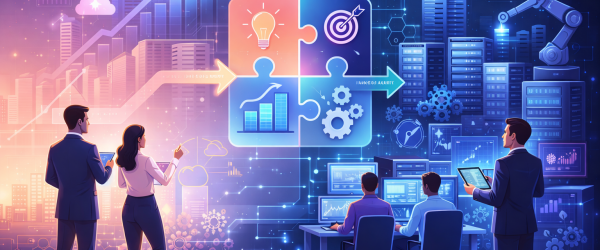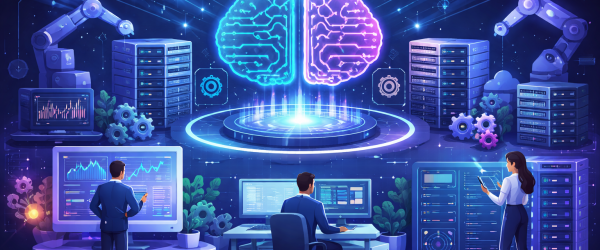Introduction
In today’s complex digital environment, the relationship between businesses and their IT partners is fundamentally changing. For decades, IT consulting and Managed Services Providers (MSPs) have been the backbone of enterprise technology, focused primarily on maintenance, integration, and issue resolution. While effective, this traditional model is now facing a seismic shift driven by Artificial Intelligence (AI).
AI is not just another tool; it’s a co-pilot, transforming reactive support into proactive intelligence. This shift is redefining the entire value proposition of IT services, moving from merely fixing problems to preemptively driving smarter business outcomes. The future of IT support is already here, and it’s intelligent.
The Limits of Traditional Service Models
Traditional IT service models often struggle under the weight of modern digital demands:
- Reactive Posture: Human teams typically respond to alerts after a failure occurs, leading to high Mean Time To Resolution (MTTR) and costly downtime. According to the Uptime Institute’s 2023 Outage Analysis, more than 25% of outages cost over $1 million.
- Data Overload: Modern, multi-cloud, and microservices architectures generate an overwhelming volume of logs, metrics, and alerts. Human analysts cannot efficiently process this noise, often leading to alert fatigue and missed critical warnings.
- Siloed Knowledge: Expertise is often held by a few individuals, making knowledge transfer and rapid scaling difficult.
- Inefficient Cost Structures: The time spent on manual troubleshooting and recurring low-level tasks keeps operational costs high and stifles innovation budgets.
The AI Transformation: A New Era of Intelligence
AI is directly addressing these challenges by embedding predictive, prescriptive, and self-learning capabilities into every facet of consulting and managed services. This convergence of AI and IT operations is often termed AIOps (Artificial Intelligence for IT Operations).
1. Moving from Reactive to Predictive
The biggest value AI brings is the ability to predict future states. AI models analyze historical performance and real-time data streams to detect subtle deviations—early warning signs—that precede major failures.
- Consulting Impact: Consultants use these predictive insights to advise clients on proactive infrastructure optimization, eliminating recurring issues at the root level rather than just patching them.
- Managed Services Impact: MSPs leverage AI to trigger automated remediation hours or days before an outage. This dramatically improves service quality; IDC projects that organizations that leverage AIOps will reduce unplanned downtime by 25% by 2026.
2. Intelligent Automation and Efficiency
AI excels at correlating seemingly unrelated events across different systems. When an incident occurs, the AI instantly links logs, network data, and application performance to pinpoint the Root Cause Analysis (RCA) in minutes, not hours.
| Traditional Approach | AI-Powered Approach (AIOps) | Operational Impact |
| Alert Management | Manual triage of thousands of alerts. | AI suppresses noise and correlates related alerts into single, actionable incidents. |
| Troubleshooting | Hours spent manually sifting through logs. | AI performs instant Root Cause Analysis (RCA). |
| Service Desk | Agents resolve repetitive Tier 1 tickets. | AI chatbots handle up to 80% of routine queries, escalating only complex issues to human agents. |
3. Redefining Consulting Value
For IT consultants, AI shifts the focus from simple technology deployment to strategic business transformation.
- Data-Driven Benchmarking: AI can benchmark a client’s IT performance against industry best practices globally, providing precise, quantitative evidence for investment recommendations.
- Security Posture Optimization: AI continuously monitors the attack surface, identifying vulnerabilities and recommending patching priorities based on risk severity, giving consulting a real-time security edge. The time saved via AI can reduce the time to identify and contain a data breach by 25%.
- Capacity and Cost Optimization: AI models predict future consumption needs in cloud environments, providing prescriptive advice to optimize spending and prevent both over- and under-provisioning.
The Human-AI Partnership
The revolution is not about replacing human consultants or engineers; it’s about augmenting their capabilities. AI handles the scale, speed, and data correlation, while the human expert provides empathy, strategic context, and domain expertise.
- The Consultant’s Evolved Role: Consultants become AI overseers, interpreting high-level prescriptive insights and translating them into business strategy and change management plans.
- The MSP’s Evolved Role: MSPs move away from being ticket-takers to becoming Strategic Technology Partners, delivering high-value outcomes like guaranteed uptime, optimized cloud costs, and security resilience.
Conclusion
AI is the indispensable technology that is bridging the gap between complexity and control in modern IT. For consulting and managed services firms, the adoption of AI is no longer optional; it is the core driver of competitive advantage and future relevance. By embracing AIOps, firms can move past the limitations of reactive support, achieve superior operational efficiency, and deliver unprecedented business value, ensuring their client’s systems are smarter, more resilient, and truly always-on.







